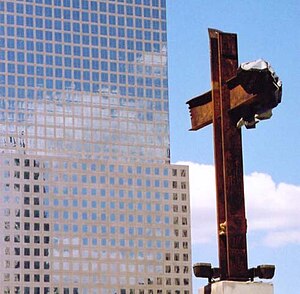9/11 is still raw. I sometimes find it difficult to realize that the awful day was eight years ago, so immediate are the emotions and memories I have. To have been a New Yorker on September 11th, 2001, is to have shared an experience all but indescribable to anyone who wasn’t there. Like combat veterans, we can only nod that knowing nod to each other and acknowledge unspoken the horror playing on the insides of our eyelids.
For me, there are snippets of sights, sounds, smells and tactile sensations that string together to form my memories of the day. I can construct a narrative of my experiences that include these snippets, but much of that narrative is formed by what I learned after the event—my memories are dropped into that narrative like illumination on a medieval manuscript.
Take, for example, the moment when the second plane exploded into the south tower. The wrenching emotion of that paradigm shift from curious onlooker to citizen at war was so consuming that I have a hard time connecting to who I was before that moment. I can close my eyes and see vividly the malevolent expanding cloud of black smoke and orange flame, and hear the sudden stillness of the crowd around me broken only by a collective gasp of disbelief. Then there is the moment (if a “moment” can seem to last forever) when the buildings fell, an earthquake-like shaking of the ground and thunderous roar that grew and grew in volume and intensity until my entire body seemed caught up in it—followed by dead silence as clouds of dust blotted out sound and light completely. I still flinch inside when a subway rumbles the ground under my feet.
Surrounded by such horror and dogged by such memories, it is easy to wonder what part faith has in all this. It is easy to be angry with God for not preventing such evil to exist, for not making me safe. The gift of free will, the gift of choice and responsibility, is a hard burden when the consequences of that gift affect not only me as an individual, but mankind as a whole. In an eerie coincidence, in the BCP cycle of psalms assigned for the 11th of the month, the psalmist cries out (Psalm 59):
Rescue me from my enemies O God;
protect me from those who rise up against me.
Rescue me from evil doers
and save me from those who thirst for my blood.
But, really, is that what God is reduced to—a divine 9-1-1 responder? I know that God cares for and about me; what I don’t know, and what I pray daily to discern, is the shape of that care, the path and purpose God wants for me. God will not make that happen, rather I must. I, not God, have the responsibility to find my mission and put it into action in my life. I’m not alone in that quest; Christ’s example guides my steps and the urgings of the Holy Spirit light my way.
And I must accept that not everyone succeeds. Some fail to find God’s path rather spectacularly, even willfully, and thus men do evil things. So, like the psalmist, I pray for protection, but I know that I might not get it. Perhaps another verse from the psalms would be a better guide, this one also from today’s readings (Psalm 56):
In God the Lord, whose word I praise,
in God I trust and will not be afraid,
for what can mortals do to me?
Fear, anger, sadness… the emotions of 9/11 are still raw for me. They are, strangely enough, a gift from God, because in the depth of such emotion lies the crux of what makes us human, what makes us capable not only of horror but also tremendously brilliant, humane, loving acts of tenderness, mercy and healing. I don’t always like having these memories and experiencing the emotions they evoke, but I fear more not having them—for if I had no emotions, then God truly would be absent in my life.


















